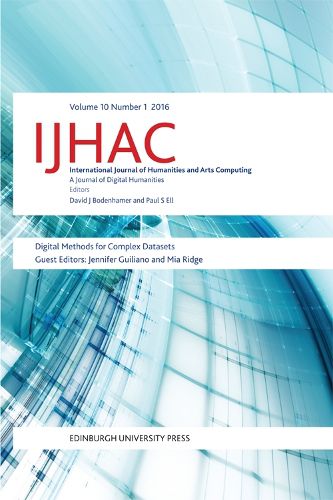Readings Newsletter
Become a Readings Member to make your shopping experience even easier.
Sign in or sign up for free!
You’re not far away from qualifying for FREE standard shipping within Australia
You’ve qualified for FREE standard shipping within Australia
The cart is loading…






Seeking to challenge the focus on ‘big data’ by understanding it outside of the computational power required to process it, this volume explores the role of digital methods in the future of digital humanities research. The essays are united by the theme of complexity - but manifest that complexity across an unusual spectrum. The methods included rise out of fields of study including library and information science, informatics, literary studies, English, and computer science. Sources explored include traditional national archives, international web archives, medieval musical scores, digitised books, early modern network ontologies and educational data/learning analytics. These essays discuss the practical implications of web scraping, the implications of creating new scholarly objects, the importance of documentation and the intricacies of applying topic modelling and linked open data methods. Together, the volume suggests that the humanities comfort with multiplicities, contingency, and uncertainty in sources may lend itself to resisting the reductionism that makes technical projects easier to manage, flattening messy, human data into neat binaries. These essays remind us that their results must be contextualised through scholars’ knowledge of the sources and the methods by which they came to be constructed not just as ‘big data’ datasets.
$9.00 standard shipping within Australia
FREE standard shipping within Australia for orders over $100.00
Express & International shipping calculated at checkout
Seeking to challenge the focus on ‘big data’ by understanding it outside of the computational power required to process it, this volume explores the role of digital methods in the future of digital humanities research. The essays are united by the theme of complexity - but manifest that complexity across an unusual spectrum. The methods included rise out of fields of study including library and information science, informatics, literary studies, English, and computer science. Sources explored include traditional national archives, international web archives, medieval musical scores, digitised books, early modern network ontologies and educational data/learning analytics. These essays discuss the practical implications of web scraping, the implications of creating new scholarly objects, the importance of documentation and the intricacies of applying topic modelling and linked open data methods. Together, the volume suggests that the humanities comfort with multiplicities, contingency, and uncertainty in sources may lend itself to resisting the reductionism that makes technical projects easier to manage, flattening messy, human data into neat binaries. These essays remind us that their results must be contextualised through scholars’ knowledge of the sources and the methods by which they came to be constructed not just as ‘big data’ datasets.